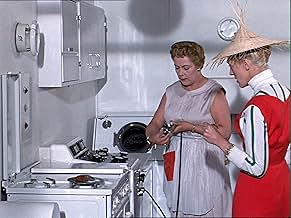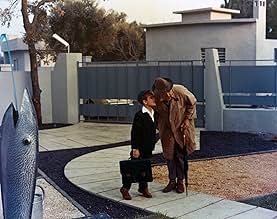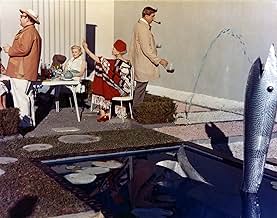Mon oncle
- 1958
- Tous publics
- 1h 56m
IMDb RATING
7.6/10
25K
YOUR RATING
Monsieur Hulot visits the technology-driven world of his sister, brother-in-law, and nephew, but he can't quite fit into the surroundings.Monsieur Hulot visits the technology-driven world of his sister, brother-in-law, and nephew, but he can't quite fit into the surroundings.Monsieur Hulot visits the technology-driven world of his sister, brother-in-law, and nephew, but he can't quite fit into the surroundings.
- Director
- Writers
- Stars
- Won 1 Oscar
- 7 wins & 4 nominations total
Jacques Tati
- Monsieur Hulot
- (uncredited)
Lucien Frégis
- Monsieur Pichard
- (as Lucien Fregis)
Jean-François Martial
- Monsieur Walter
- (as J.F. Martial)
Alain Bécourt
- Gérard Arpel
- (as Alain Becourt)
Régis Fontenay
- Braces Dealer
- (as Regis Fontenay)
Daki
- Daki, the Arpels' Dachshund
- (uncredited)
Dominique Derly
- La secrétaire de Monsieur Arpel
- (uncredited)
- …
André Dino
- Le balayeur municipal
- (uncredited)
- …
- Director
- Writers
- All cast & crew
- Production, box office & more at IMDbPro
Featured reviews
Jacques Tati needs a statue in the movie history hall of fame. He will have it, eventually. As an actor, he created Monsieur Hulot, a sort of post-modern Chaplin, walking through the world as estranged and yet delighted, as a middle-aged ET. As a director, he did about the same thing, but added a visual brilliance, a classical sense for the absurd, and a lot of poetry.
Mon oncle, My uncle, is pretty much the manifesto of his artistic raison d'etre. The uncle, Monsieur Hulot, with his timeless, almost zen-like attitude to life, is contrasted by the successful bourgeoisie family, trying so hard to shine. What happens in the movie, is simply the little everyday absurdities rising out of this meeting of contradictions.
Tati makes fun of everyone, but in such a gentle and loving way, no one gets hurt. He is truly enjoying himself, when observing the little madnesses of modern man. There is no call for anyone getting really angry at anyone else.
Still, there are statements, and they are provoking if pondered. Tati probably succeeded in balancing the 1950's unreserved delight in consumer gluttony, with a bit of a taoist reconsideration as to the significance of it all. Without Tati and his movies, it is quite likely that we would have taken much longer in glimpsing the futility of earthly possessions, and that which has for the last half-century been called progress.
And contrary to many other movies of up to the same age, Mon oncle carries the years with just as straight a posture as the one of Monsieur Hulot. They should show this movie in the schools, so that all kids get to see it and reflect.
Mon oncle, My uncle, is pretty much the manifesto of his artistic raison d'etre. The uncle, Monsieur Hulot, with his timeless, almost zen-like attitude to life, is contrasted by the successful bourgeoisie family, trying so hard to shine. What happens in the movie, is simply the little everyday absurdities rising out of this meeting of contradictions.
Tati makes fun of everyone, but in such a gentle and loving way, no one gets hurt. He is truly enjoying himself, when observing the little madnesses of modern man. There is no call for anyone getting really angry at anyone else.
Still, there are statements, and they are provoking if pondered. Tati probably succeeded in balancing the 1950's unreserved delight in consumer gluttony, with a bit of a taoist reconsideration as to the significance of it all. Without Tati and his movies, it is quite likely that we would have taken much longer in glimpsing the futility of earthly possessions, and that which has for the last half-century been called progress.
And contrary to many other movies of up to the same age, Mon oncle carries the years with just as straight a posture as the one of Monsieur Hulot. They should show this movie in the schools, so that all kids get to see it and reflect.
This is Tati's 'Modern times', a critical stab in the side of civilization and the changing of the times in Paris in the late 1950's... and it's absolutely delightful and disarming in its simple display of the absurdities of human behavior in relation to it. I vaguely remember watching this as a nine-year old... and 29 years down the track, it's a great realization to suddenly understand why Tati was regarded as a true movie-making artist. Watching this lovable gem of a movie is like watching a pastel painting elaborately (and slowly, so patience is required!) coming to life. Just watch that recurring shot where the crumbled brick wall borders the old-time, lively street to the new, sterile concrete apartment complex blocks. Symbolism at its best!
No laugh-fest exactly, but it's loaded with charm, both heartwarming and satirical, with an attention to sets, props and character detail that's quite amazing: the opening credits... the ubiquitous dogs, the street-sweeper, the vendors, the bar guests... and most importantly: the whole household (and garden!) of Hulot's sister! And finally, what about that accordion music score? It has to be one of the best in cinema history!!
8 out of 10 from Ozjeppe
No laugh-fest exactly, but it's loaded with charm, both heartwarming and satirical, with an attention to sets, props and character detail that's quite amazing: the opening credits... the ubiquitous dogs, the street-sweeper, the vendors, the bar guests... and most importantly: the whole household (and garden!) of Hulot's sister! And finally, what about that accordion music score? It has to be one of the best in cinema history!!
8 out of 10 from Ozjeppe
Jacques was making a movie to WATCH for future generations to see how the simple social life in the small country towns were going to be killed off with modernism and technology. In his world, safety, community, young/old mixed socialized, street sweepers socialized with Gov't officials... modernism: Isolating, cold, ignorant. Material goods cannot replace a good doughnut and horseplay outdoors. A Vingnette of how the world was changing at that time to where we are today. The music plays in the small quaint town. Where happiness and familiarity go hand in hand. As we see he can survive in that world fine. Modernism is replacing and displacing kind hearted men like my Uncle. A simple loving man who loves the countryside and can no longer assimilate into the new modernism. The movie is done with love and slow funny visuals. It is to be absorbed, and watched as if YOU are the Voyer one summer with My Uncle. The storyline a Social Commentary of post modernism.
This was my introduction to the world of Jacques Tati...and I liked it. If Tati's filmmaking M.O. was to remind us of Charlie Chaplin & Buster Keaton, mission very successfully accomplished. 'Mon Oncle' could have been a silent film. It uses sound effects and music to tell 75% of the story anyway, just as Charlie and Buster and their contemporaries did so well in the talk-free era. He also has their simplicity of camera movement. And as with those film giants, Tati is the star/director/producer and co-writer of this project. His recurring Monsieur Hulot character isn't as famous as the Little Tramp, but the quirky Frenchman is just as bumbling and likable.
In line with Chaplin's 'Modern Times', the theme of 'Mon Oncle' is the inability of one man to adapt to new technology. The slapstick sequences that result from the clash of man versus machine are more amusing than truly hilarious. There are a few big laughs, but you'll smile more than than you'll guffaw. There's no standard plot. Hulot's sister, her husband, and their son live in an ultra-modern '50s house. (This weird set is truly magnificent.) Occasionally, they have trendy guests---the out-of-place Hulot among them---and he inadvertently gets the ball of chaos rolling. If his sister's house is too bizarre for him, he still gets to enjoy old-fashioned pleasures in other areas of France. He doesn't fit in with these social climbers, but the man is charming and unflappable in his own eccentric way.
This movie looks as stunning as Hitchcock's 'Vertigo' (also released in '58). Both pictures use colour extraordinarily well (especially green) and Tati's film would be worth seeing for the visuals alone. He also makes it a delightful aural experience with a jaunty music score and comical sound design. It's not all a cold technical exercise, though. The acting is a bit exaggerated (except for Tati's underplaying), but they only look foolish in the name of laughs. Will you enjoy a French comedy from nearly 50 years ago? Is 'Mon Oncle' just a critical darling (Oscar for Foreign Language Film, a prize at Cannes) and not an audience picture? Hey, I didn't think I'd be entertained by a two-hour French trifle, but I was. Rent the Criterion DVD and drink in the plush visuals, then have some grins. Come for the pretty, stay for the witty.
In line with Chaplin's 'Modern Times', the theme of 'Mon Oncle' is the inability of one man to adapt to new technology. The slapstick sequences that result from the clash of man versus machine are more amusing than truly hilarious. There are a few big laughs, but you'll smile more than than you'll guffaw. There's no standard plot. Hulot's sister, her husband, and their son live in an ultra-modern '50s house. (This weird set is truly magnificent.) Occasionally, they have trendy guests---the out-of-place Hulot among them---and he inadvertently gets the ball of chaos rolling. If his sister's house is too bizarre for him, he still gets to enjoy old-fashioned pleasures in other areas of France. He doesn't fit in with these social climbers, but the man is charming and unflappable in his own eccentric way.
This movie looks as stunning as Hitchcock's 'Vertigo' (also released in '58). Both pictures use colour extraordinarily well (especially green) and Tati's film would be worth seeing for the visuals alone. He also makes it a delightful aural experience with a jaunty music score and comical sound design. It's not all a cold technical exercise, though. The acting is a bit exaggerated (except for Tati's underplaying), but they only look foolish in the name of laughs. Will you enjoy a French comedy from nearly 50 years ago? Is 'Mon Oncle' just a critical darling (Oscar for Foreign Language Film, a prize at Cannes) and not an audience picture? Hey, I didn't think I'd be entertained by a two-hour French trifle, but I was. Rent the Criterion DVD and drink in the plush visuals, then have some grins. Come for the pretty, stay for the witty.
The word I would use to describe this film is "amusing", not "hilarious"; "amusant" rather than "rigolo". It gently charms a smile onto your face. Only rarely does it bring out an actual guffaw (when M. Hulot is faced with his sister's kitchen, for example). Tati refuses to impose his own ideas of what is important on the viewer, which is usually done by spending more screen time on them or zooming in. The title (usually considered to be important) is a scrawled piece of graffiti which stays on the screen for less than 1/2 second, but there are long sequences showing M. Hulot's apartment. The viewer has to work to see Hulot appearing (apparently randomly) in the various windows of the building as he walks through it. I love the window which is inexplicably at foot level in which you can see Hulot's feet turn to the wall as the feet of a woman dressed only in a slip appear.
In other words, this film is a stroll where, if you keep your eyes open, you will spot some amusing things going on. And France is a great place for a stroll.
Two more things. While the comparison to Chaplin is apt, I was led to think of later characters, particularly Hrundi Bakshi in Blake Edwards' The Party and another almost silent character, Rowan Atkinson's Mr. Bean. Indeed I'm sure Atkinson stole ideas from this film.
Also, I think it is misleading to focus too much attention on M. Hulot's struggles with modern tech. The title, Mon Oncle, should direct our attention to the nephew, for whom Hulot is a parole from the prison of his sterile house, enabling him to run with the kids, get dirty, buy doughnuts from a grubby vendor who applies the icing sugar with a bare hand and play practical jokes on passers-by (with Hulot ready to cover for him if need be). Fifty years later these comments are even more biting as we look at a whole generation of children raised in this kind of inhuman antiseptic environment: overweight, with eating disorders and allergies, socially inept with only a TV and a video game for a friend. Makes a dachshund in a red coat want to run with the mutts and tip over a garbage can or two, doesn't it?
In other words, this film is a stroll where, if you keep your eyes open, you will spot some amusing things going on. And France is a great place for a stroll.
Two more things. While the comparison to Chaplin is apt, I was led to think of later characters, particularly Hrundi Bakshi in Blake Edwards' The Party and another almost silent character, Rowan Atkinson's Mr. Bean. Indeed I'm sure Atkinson stole ideas from this film.
Also, I think it is misleading to focus too much attention on M. Hulot's struggles with modern tech. The title, Mon Oncle, should direct our attention to the nephew, for whom Hulot is a parole from the prison of his sterile house, enabling him to run with the kids, get dirty, buy doughnuts from a grubby vendor who applies the icing sugar with a bare hand and play practical jokes on passers-by (with Hulot ready to cover for him if need be). Fifty years later these comments are even more biting as we look at a whole generation of children raised in this kind of inhuman antiseptic environment: overweight, with eating disorders and allergies, socially inept with only a TV and a video game for a friend. Makes a dachshund in a red coat want to run with the mutts and tip over a garbage can or two, doesn't it?
Did you know
- TriviaJacques Tati borrowed dogs from a local pound for the film and took care of the dogs all through filming. Tati made several shots of them, which he later used to connect scenes. When filming was over, he didn't want to bring the dogs back to the pound, so he placed an advertisement in the newspaper, calling them "movie stars"; all dogs eventually were taken in by respectable families throughout Paris.
- GoofsWhenever M. Arpel parks his car in his tiny home garage, he always pulls in front-end first; however, whenever he leaves for work in the morning, the car always exits the garage front-end first. (This may be a subtle sight gag on (Jacques Tati)'s part.)
- Quotes
Charles Arpel: We could go to the Sexy Club.
Madame Arpel: I prefer Constantino and his nice music.
- Crazy creditsThe opening credits appear on signs at a construction site.
- Alternate versionsAn English version of the movie, that is some 10 minutes shorter with less dialogue, was shot side-by-side with the French version.
- ConnectionsFeatured in Omnibus: Monsieur Hulot's Work (1976)
- How long is My Uncle?Powered by Alexa
Details
Box office
- Budget
- FRF 250,000 (estimated)
- Gross worldwide
- $87,444
- Runtime1 hour 56 minutes
- Sound mix
- Aspect ratio
- 1.37 : 1
Contribute to this page
Suggest an edit or add missing content


![Watch Bande-Annonce [VO]](https://m.media-amazon.com/images/M/MV5BZmEzNzA5M2ItZTRhMi00YThkLThlMTItY2M2NThiYTI4NTc3XkEyXkFqcGdeQXRyYW5zY29kZS13b3JrZmxvdw@@._V1_QL75_UY281_CR6)



























